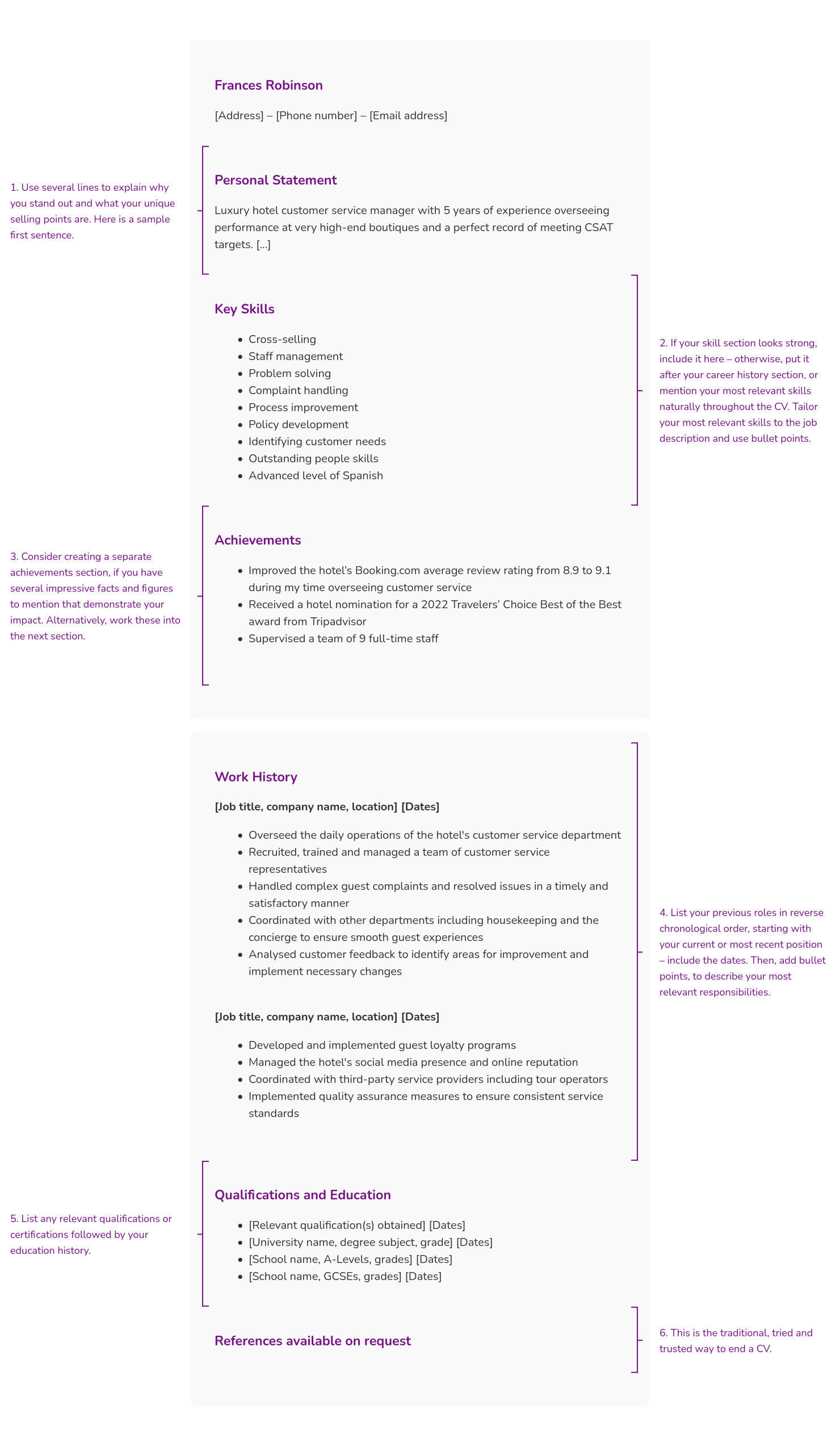There are many different ways to make your hospitality CV stand out. In this article, we’ll share some dos and don’ts to help you write a great CV.
We’ll also run through an example CV for a hospitality role to give you some inspiration.
According to ONS statistics, approximately 1.8m people work in the UK hospitality industry – roughly 2.5% of the population and 5.5% of the workforce based on labour market figures.
Pre-pandemic in 2019, the sector generated a whopping £40.4bn in gross value added and that doesn’t even include revenue from hotels! Now the industry looks set for growth, with a CAGR of 2.8% predicted by 2027, according to data from research company GII.
Although there are plenty of people working in hospitality, that means there’s lots of competition for the best roles in restaurants, hotels, cafés, bars, clubs and so on.
To get a good job in this sector, you need a CV that does justice to your experience and skills – let’s take a look at how to make that happen.
Hospitality CV dos and don’ts
When writing a CV for hospitality roles, or any job, keep the reader in mind. Think hard about what potential employers want to see – whether you’re going for a role as an event planner, receptionist, chef, salesperson, hotel manager, bartender, etc.
Do:
- Strike a professional tone.
- Keep the layout and formatting simple and effective, so the document is easy to read and the key information is straightforward to find.
- Highlight your achievements: Describe in detail your career experiences so far and biggest successes.
- Include your hard and soft skills: Tailor them to the job description because some of these will be more relevant to the role than others.
- Write an attention-grabbing personal statement: Who are you, what can you bring to the table and what are your career ambitions? Spend time getting this bit as good as it can be, because if it doesn’t tick the right boxes, the reader might not continue.
You may want to leave space for the personal statement at the top of your CV but write it at the end, once you’ve worked out your greatest strengths and achievements.
Don’t:
- Add personal details such as your age or marital status.
- Mention salary expectations.
- Put your photo on a CV unless applying for a role outside the UK, if so, research the local requirements online, as employers in some countries may expect one.
- Lie on a CV because it won’t do you any favours.
Also, try not to use generalisations or clichés on your CV to describe your best attributes. In the next section, we’ll go through the better way to describe your achievements.
Hospitality skills
The jobs you’re applying to will hopefully mention some hard and soft skills that the employer sees as either required or desired.
One clear way to show employers which of these you have on your CV is to add a key skills section. Otherwise, if you prefer, you can work your skillset into the personal statement and career history sections more naturally, as long as they still stand out.
Some of the skills that employers are looking for include the following. However, it depends greatly on the sub-sector of hospitality that you’re focusing on – a travel operator and waiter have different responsibilities, for example:
- Cross-selling
- Upselling
- Staff management
- Problem solving
- Health and safety
- Complaint handling
- Process improvement
- Payment processing
- Identifying customer needs
- Inventory management
- Food hygiene
- People skills
- Foreign language skills
But how can you demonstrate that you truly have what it takes on your CV? By supporting your claims with evidence.
It’s not always easy to find facts and figures for a CV to show your success in previous roles – but always try to add some. Include any relevant and impressive statistics to prove the impact you have had.
This evidence will have more weight in context. Use the STAR method to explain your best achievements and if you need a few sentences to do it, your cover letter is a good place for this.
No hospitality experience yet? No problem – here’s how to write a CV with no experience.
Otherwise, here’s a hospitality CV example to help you get started:
CV example

Frances Robinson
[Address] – [Phone number] – [Email address]
Personal Statement
Use several lines to explain why you stand out and what your unique selling points are. Here is a sample first sentence:
Luxury hotel customer service manager with 5 years of experience overseeing performance at very high-end boutiques and a perfect record of meeting CSAT targets…
Key Skills
If your skill section looks strong, include it here and if not, after your work history section. Match your skills to the job description and use bullet points – for example:
- Cross-selling
- Staff management
- Problem solving
- Complaint handling
- Process improvement
- Identifying customer needs
- People skills
- Advanced level of Spanish
Work History
List previous roles or the companies you’ve worked at in reverse chronological order, starting with your most recent or current position and also including the dates.
Then add bullet points, to describe your relevant responsibilities or successes, e.g.:
[Role, employer] [Dates]
- Improved the hotel’s Booking.com average review rating from 8.9 to 9.1 during my time overseeing customer service
- Received a hotel nomination for a 2022 Travelers’ Choice Best of the Best award from Tripadvisor
- Responsible for developing customer service policies, managing a budget, evaluating staff, handling complaints and implementing a new customer loyalty programme
- Supervised a team of 9 full-time staff
Qualifications and Education
Start by including any relevant qualifications, then give your education details:
- [Relevant qualification(s) obtained] [Dates]
- [University name, degree subject, grade] [Dates]
- [School name, A-Levels, grades] [Dates]
- [School name, GCSEs, grades] [Dates]
Interests
Any interests you include should ideally strengthen your application in a relevant way, if possible. If you’re short of space on your CV, this section isn’t essential.
References available on request
Final thoughts: How to write a hospitality CV
There are several different types of CV, so you need to decide which one is right for you. The above example uses the common reverse-chronological format but you may prefer to try a more skills-based approach.
If it’s been a while since you last wrote a CV, or this is your first one, then here’s how to write a CV – our comprehensive guide.
Also, check out our article on writing a CV for temporary jobs, perfect for seasonal work opportunities. If you’re using a master CV, make digital copies and tailor each one to the specific job description.
Don’t undo all your hard work on the CV by making easily avoidable mistakes. Keep reading through and checking it until you’re happy – find any mistakes and fix them, then ask a friend or family member to review it in case they spot anything else.
Focus on highlighting your strongest skills and what makes you an outstanding candidate, then build the CV around these points.
If you need some help with any of this, look no further – we’re CV writing experts. We know how to write a great hospitality CV for all types of roles, so please don’t hesitate to get in touch with any queries.


